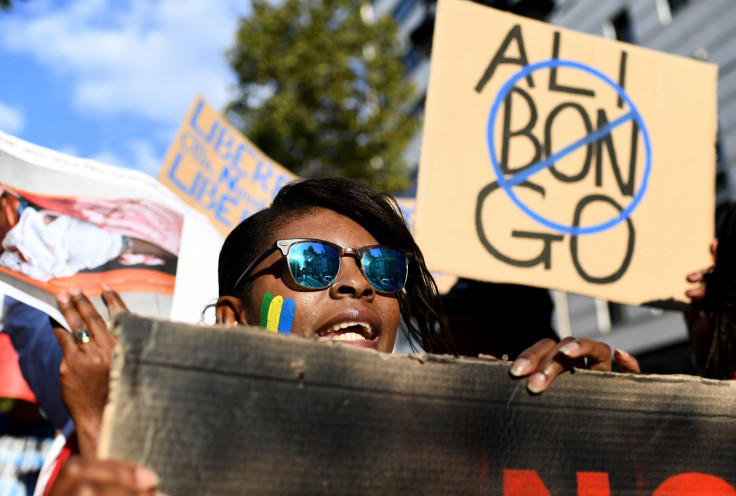Gabon opposition leader Jean Ping urges 'active resistance' against President Ali Bongo
Call for a general strike as part of plan to 'massively reject' the legitimacy of Bongo's re-election.

Gabon's opposition leader, Jean Ping, who claims he was cheated of victory during the recent elections, has urged the Gabonese people to "actively resist" Ali Bongo's power after his swearing-in ceremony as president for a second seven-year term this week.
Ping, 72, accused the incumbent leader of vote rigging to secure a win and filed a request for a recount of the votes within the nation's Constitutional Court.
A revised narrow result
Recounts are not unprecedented in Gabon – the court ordered a recount that upheld Bongo's victory in 2009.
In its 24 September ruling on Bongo's win, the Constitutional Court partially changed the results.
While Bongo was initially awarded 49.8% of the vote – beating Ping's 48.2% – with wafer-thin margin of fewer than 6,000 votes, the court then said Bongo had taken 50.66% of the vote against 47.24% for Ping. The new results put Bongo's margin at 11,000.
The European Union, which had sent observers during the vote, questioned the integrity of the electoral process, explaining its monitoring mission was only given "very limited access" to the court review process.
The final result received a cool reception from the international community, including from the United Nations and African Union.
Former colonial ruler France said it regretted the ruling had not "lifted all the doubts" about the process.
Bongo was sworn into office after the court validated his controversial re-election in the 27 August vote, but Ping rejected the high court's ruling, adding that the court had demonstrated "bias" in its "unjust" decision to uphold Bongo's victory.
Ping: 'We must all reject this military-electoral coup'
Setting the stage for a potentially violent showdown, Ping called for the Gabonese to "massively reject" the legitimacy of Bongo's re-election and to "not give credence in any way to (his) power". In a lengthy statement published on 29 September, the politician doubled down on his claim that he was the legitimate winner of the presidential election.
"I re-affirm my commitment to my responsibilities as president elected by the sovereign people; beyond the circumstances imposed on us," Ping said in the statement on his official Facebook page.
"I live with the responsibility of taking care of the Gabonese people who elected me on 27 August 2016. (As the) President elected by you, the Gabonese people, I reaffirm Urbi et Orbi that I will not recognise the authority of Ali Bongo, whose hands are stained with the blood of our countrymen."
Describing Bongo's re-election as a "military-electoral coup", Ping called "on each and every Gabonese people to carry out an active resistance until the end of this abuse of power".
"Our fight is not against an individual or a group of individuals: whoever they are. Our fight is against a dictatorial system and for democracy (...) The Gabonese people must reject and obstruct with the greatest determination this new imposture that [he] wants to impose on our country.
"We must all reject this military-electoral coup that offers no prospects for Gabon. I personally commit to it."
National dialogue is 'vain attempt to legitimise the abuse of power'
In a bid to ease the simmering tensions in the West African nation, Bongo earlier this week promised a national dialogue but excluded the option of international mediation.
In his statement, Ping highlighted that, while he was "not fundamentally against the dialogue", he would refuse "to go to any dialogue under the aegis of this impostor".
"What dialogue? With whom and for what purpose? Here is someone disowned by the people and beaten at the polls, who calling on whom he stole the election from to come talk with him! ... My position on this is clear, I do not associate myself to this vain attempt to legitimise the abuse of power that the Gabonese people are denouncing."
The politician, however, agreed to carry out an inclusive national dialogue to be held at his initiative and on terms that are being studied. "I invite the Gabonese of all conditions, so that we sit around a table to lay together the foundations of the new Gabon we all want: a Gabon of justice, truth, transparency and good governance."
Adding the dialogue would include "the new majority", Ping invited political parties, trade unions, civil society, religious groups, the diaspora and all other forces of the nation to take part.
Ping, who had been a close ally of former President Omar Bongo – President Ali Bongo's father –called for a general strike on 6 October, effectively urging the Gabonese to stay at home.
President Bongo took over the resource-rich nation in 2009 when his father died after running the country for more than 40 years.
© Copyright IBTimes 2024. All rights reserved.






